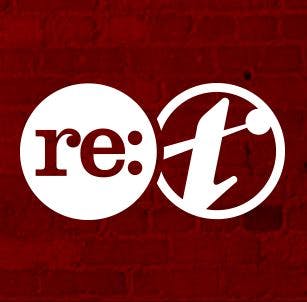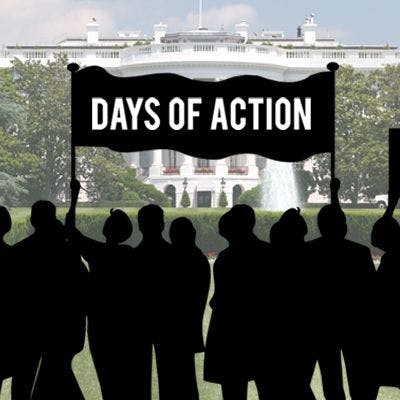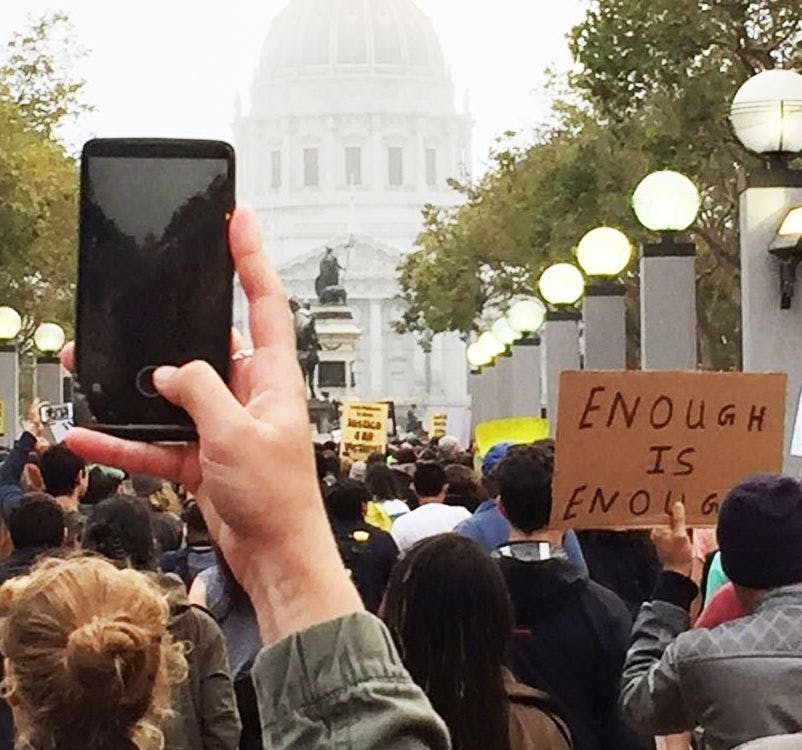Giving Employees Paid Leave for Activism Ignites Firestorm
By Traction
Some people call me a "candy ass." And I'm okay with that.
Article written by Adam Kleinberg, originally published on Fast Company .
That was just one of the very nasty things I—and my agency Traction—were called shortly after I wrote a post on LinkedIn last month called "Why We're Offering Paid Leave for Activism," describing a new policy of giving our staff two days off per year to protest, canvass, or volunteer—whatever they deem fit to participate in our democracy. We called the program "Days of Action."
The backlash was swift and cruel, and it hasn't gone away. But it's only convinced me even more that providing paid leave for activism is more important than ever.
Many of our critics, of course, read the move as anti-Trump. We soon found ourselves written up in Breitbart as "evidence" of the fallacious claim that anti-Trump protesters have been paid to attend rallies and disrupt congressional town halls since the inauguration. The post became one of Breitbart 's most commented-on stories that day and led to a slew of coverage in virtually every far-right publication out there. Traction received hateful comments, emails, harassing phone calls, a slew of one-star Facebook reviews, and calls for a boycott of our agency. We've been called everything from unpatriotic fascists to "pansy snowflakes"—and, of course, "candy asses."
But the criticism hasn't just come from right-wing political activists. I even received a note from one Silicon Valley CMO saying, "I hope you don't lose too much business from many of us that are tired of the pathetic behavior of protesters."
It's one thing to abstractly acknowledge that taking a stand could have repercussions on our business. It's another to witness a revenue opportunity evaporate because of it.
Even so, I can tell you unequivocally, I'd do it again in a heartbeat.
Since the election, there's been a really positive trend toward civic engagement like I've never seen in my lifetime. Even the most hateful feedback we've weathered—while far from civil or constructive—is of a piece with that upsurge. Democracy is a participatory institution. It's not just something that happens to you every four years when you have a candidate in the race. My partners and I wanted to do something to acknowledge and support that.
At the same time, not everyone's beliefs are the same. My partners and I felt strongly that this shouldn't be a Democrat thing or a Republican thing, but should encourage everyone to get involved regardless of their personal beliefs. And we still do.
We also wanted to inspire other companies to support civic engagement. There have already been "volunteer time off" initiatives put forth by companies like Salesforce . Others, like Facebook , have chosen to take a stand on a single, self-interested issue like immigration. We went a step further by supporting all kinds of activism—including protest. We believe that if more people become civically engaged, our democracy will work better for all of us. Businesses—which are now struggling to show they can demonstrate values and still make money —should support this, not run from it.
Despite the negativity, our experience over the past few weeks proves precisely why.
In fact, most of the response has been overwhelmingly positive. Clients—and prospective clients—have emailed to express support. The team at Traction has been galvanized. They've responded by trolling the trolls, selling T-shirts that say "boycott Traction #candyasses." Any profits we make from that merch will be donated to the ACLU —not because we're wading into the partisan fray but because civil liberties (including the right to protest) are blind to party divisions; they're the foundation of our democracy and a value that we as an organization steadfastly care about.
But far beyond any net positive business impact all this attention may or may not bring, I feel like my 50-person team has helped spark a movement. First, a group of women in Los Angeles sent me a note thanking us for what we are doing—with four pages of signatures. Next, I received an email from the CEO of a 300-person Oakland technology company who told me that she was inspired by our program and is introducing a similar policy at her company. Then a health care company with 230,000 employees emailed to learn more about the policy we put in place because it's going to create one, too.
When I first wrote about this move on LinkedIn, I ambitiously declared that we wanted our two "Days of Action" for our employees to inspire two million days of action from like-minded companies around the country. A few weeks later, we're well on our way.

Jenn Maer of IDEO talks about her background as a story/copywriter, IDEO's "design thinking" approach, and the big "oh shit" questions that they strive to answer.

To CMOs, politics can be like the Sirens of Greek mythology to marketers.

Traction continues to gain coverage for the barrage of trolls in response to our "Days of Action Policy.